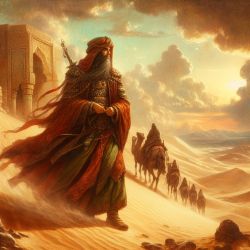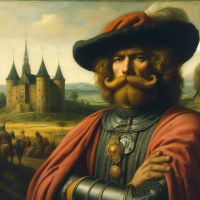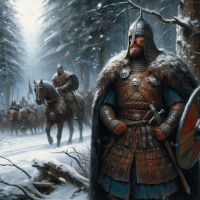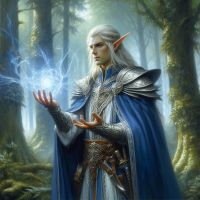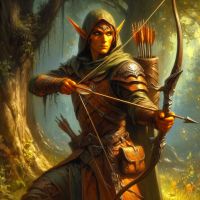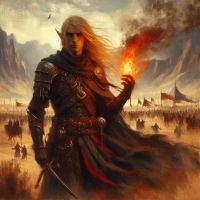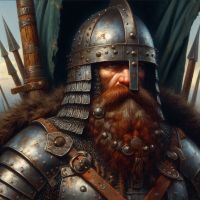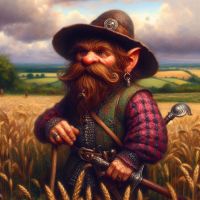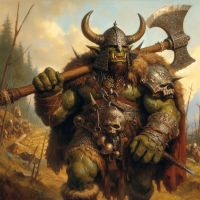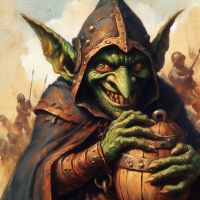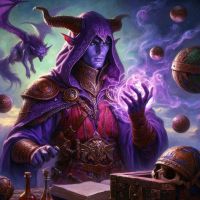The Khadan Humans
|
| Khadan Humans | |
|---|---|
| Pronunciation | Kaa-dan |
| Classification | Human |
| Nicknames | Desert Folk, Desert-dwellers |
| Languages | Common, Anjyarri, Azari |
| Average Height | 1.70m - 1.90m (5'7" - 6'3") |
| Average Weight | 65kg - 80kg (143lbs - 176lbs) |
| Maximum Age | ~80 Years Old |
| Stat Bonuses |
+2 Strength +0 Defense +2 Agility +0 Intelligence |
Living along the coast of the Al’Hadar Deep, their cities standing out as shining jewels between the dunes of the Anjyarri desert, the Khadan, as they are known, inhabit the sun-scorched realm known as Anjyarr. Their history is one shrouded in ancient legends, arcane sorcery, mythical kings known as Pharos, and secrets that now remain hidden beneath the sands of the dune sea. These people, born and formed by their history, have introduced their own wisdom to Eden through inventions and philosophy. Now, they are defined by their resilience, compassion, and their will to thrive in the harshest of environments.
The world knows the Khadan as merchants, sailors, having a sea-faring nature. Their cities are filled with bustling bazaars offering precious minerals, exotic spices, and master-crafted wares such as musical instruments and tools. Trade is their lifeblood, and it can be seen flowing to the farthest corners of the continent. This has caused them to develop a respect for other cultures, races, and religions. Accepting them for who they are, no matter their origin, for trade is more important to them than unnecessary disputes over differences.
To see a Khadan is to see the representation of the desert itself. The climate and culture of their realm has introduced them wearing vibrant and colorful robes, showing the beauty, but also the intensity of the desert and sea.
Nowadays, the Khadan are often underestimated due to their compassionate views and hospitality. Yet, the Khadan have a deep-rooted warrior’s spirit, burning with the desire to defend their homeland, their culture, and their history whenever threatened. No one knows the oceans and the deserts better than the Khadan, and those that forget their origin, shall easily succumb to their insolence.
“While their loyalty to the Azari’Lunn brings me nothing but disdain, one cannot deny that their generosity and expertise in their crafts are astounding. They elevated societies with new science, math, and various inventions. Their cities stand out as jewels in the desert. And yet, I wonder if it will remain for centuries to come. Only the Mother and time can tell.”
|
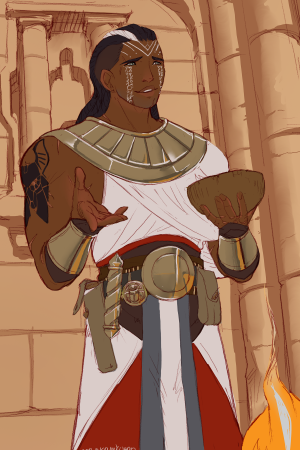
Character Creation
Appearance
Compared to the remaining human inhabitants of Eden, the Khadan people's physical appearance distinguishes them from the rest, be it by their attire, culture, and, of course, their darker skin tones. Compared to the average Attian, Khadan men are slightly shorter, reaching an average height of 180cm (5'9"), and women reaching an average height of 170cm (5'5").
Looking back at the history of the Khadan, one can see that their population consisted of numerous tribes, each settling in different regions of the desert that suited their needs for survival. Due to their diverse surroundings, the appearance of the Khadan changed over time, making each tribe varied, yet all shared the common trait of having a tan or dark skin tone. The tribes, collectively known as the Zanmirs, inhabited the coastal areas and regions near waterways, becoming renowned for their captivating beauty among the Khadan people. Over time, their appearance shifted to having a lighter complexion similar to an Attian who had been sun-kissed, having long flowing hair in shades of brown and red, which was complemented by eyes in various shades of green and brown.
Compared to these tribes, those known as the Zanmir tribes had chosen their homes in the vast desert regions and had striking differences from those at the coast. Their hair spectrum ranged from profound dark darkness of jet black to even the rare gleam of near-white, an exceptional characteristic that only a few Khadan could have. Skin tones ranged from a deep, sun-burnished tan to a rich, dusky, or deep brown, with their eyes displaying hues that spanned from deep brown to captivating shades of orange illuminated by the desert sun. The enigmatic beauty of hazel eyes made an occasional appearance as well. The Khadan don cloaks to cover themselves in various colors and seek shelter from the relentless sun. However, at times when these cloaks were removed in rural areas, their arresting appearance inevitably captivated onlookers when they emerged into the streets.
The topic of beauty among female Khadans mainly involves maintaining both body and hair to a high standard. Having the contours of an oval shape, elegantly shaped dark eyebrows, and exquisitely detailed eyelashes that contrast sharply with the eyes are considered a defining feature. Men traditionally sport meticulously maintained facial hair, ranging from beards and mustaches, often taking inspiration from their northern human neighbors. In some Khadan cultures, any form of visible or hidden scars is revered as a mark of beauty. These scars would often symbolize courage, strength, and honor. It is also not uncommon to see a person's body covered in various tattoos. Seen as a form of art in Khadan society, these tattoos would depict culture, history, family bonds, and religion. Favored are those symbolized with stars or religious deities or animals.
Languages
In the populated areas of Anjyarr, primarily both rivers and the coastal regions, the predominant language spoken by the Khadan is Anjyarr. Anjyarri is a dialect that formed from its root language of Akhadi due to the influence and mixing of the Azari'lunn language, which ultimately became more prevalent than Akhadi itself. When the Khadan language of Akhadi formed remains unknown. Yet, it is speculated to have emerged during the first ancient Empire of Anjyarr. Anjyarri itself formed roughly around the first centuries of A.F.S. and has since then been established as the national language of the civilized regions of the desert.
Although there are few differences between the two languages, some individuals are able to understand both. However, due to future generations no longer being taught in Akhadi, the language itself has become somewhat estranged and distant, often mistaken to be the actual dialect instead of Anjyarri by modern-day citizens and non-natives of Anjyarr who are not familiar with the origins of the language. However, despite this, the language of Akhadi continues to be spoken dominantly among the nomadic residents of the desert, particularly by the diverse tribes collectively known as the Kha'mal. Some have described Akhadi as being pronounced more harshly yet having a mysterious tone to it.
| Anjyarri Dialect: Quick Guide | |||||
|---|---|---|---|---|---|
| Greetings | Races | Titles | |||
| Common | Anjyarri | Common | Anjyarri | Common | Anjyarri |
| Hello | Merhaba | Human | Adam | 'Prophet of The People'' | Pharo |
| Welcome | Merbaan | Dark Elf | La'adam | Emperor | Sultan of Sultans |
| Goodbye | Verdaba | Tiefling | I'jadam | Empress | Sultana of Sultans |
| How are you? | Jut lo'ua | Wood Elf | Erididam | King / Queen | Sultan(a) |
| Nice to meet you. | Iru nunyeti ua. | High Elf | Ue'ladam | Prince | Şehzade |
| Friend | Tovara | Denur | Jitadam | Princess | Shehzadi |
| Halfling | Sha'adam | Patriarch | Hemiria | ||
| Faulskin | Adamja | High-priest(ess) | Al-Kahyn(a) | ||
| Duke | Sheihykh | ||||
| Duchess | Shahykh | ||||
| Lord / Lady | Emyhr(a) | ||||
| Ser / Dame | Sih'di / Mih'de | ||||
| Noble | Nabil(a) | ||||
| Chieftain | Zaeim | ||||
| Advisor | Astisha | ||||
Naming Schemes
In Anjyarr, as elsewhere, the personal name of an individual was the most important means of identification, not only in this life but in the hereafter and in social memory for eternity. To the Khadan, the name and essence were inseparably interconnected. In their ancient culture and religion, it was believed that the world was created by pronouncing the name of everything that came into existence, and, in magical practice, knowing the "true" name of supernatural and transcendent beings helped one to gain power over them. Thus, the name was considered a vital constituent of one's personality in Khadan culture.
Names would often be differentiated or linked to historical or literary figures. These include the names of legendary figures, kings, religious personalities, and old gods and goddesses. For instance, male names like Ahman, Muhaddin, Metehan, and Khurshid and female names such as Sa'har, Isha, Ra'na, and Met'hani reflect this tradition.
In modern times, Khadan names have taken on new forms, often appearing as compounds or bearing specific meanings. Female names commonly feature suffixes such as -i, -eh, -ah, or -a, as seen in Somayeh, Noora, Kazirah, Farid, Shana, Mija, Jahanara, and Sadia. Meanwhile, male names, which had common short first names, often end with -an, -ar, -id, -ad, -in, -ir, -al, or -il, for example, Danyal, Rashad, Qusar, Sahil, and Zayan.
Furthermore, the addition of -El or -Al serves as the definitive article, indicating that the family name begins with "the." This convention often signifies the family name's association with a profession. However, there are instances it may also be associated with a title or specific origin of the person in question.
Cultures
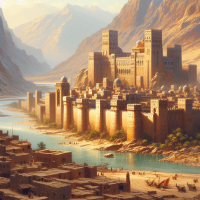
|
The Sultanate of Anjyarr | At the mouth of the great Ifriq delta lies the emirate of Al-Khadir, capital of the great Sultanate of Anjyarr. It is a paradise of great wealth and prosperity in the midst of an unruly wasteland. Founded by a tribe of nomadic traders, whom settled due to the pleasant climate and geographic location near the Ifriq, Al-Khadir quickly became a trading hub for races all around the world. The city is a gateway to anyone wishing to enter the Southern world. It offers a large market for all kinds of goods, from elven trinkets to dwarven drinks, but also an extensive range of local wares such as tobacco, carpets, coffee, spices, and garments! |
|---|
World View
Noteworthy Characters
King Tarath the First
Born in the temple city of Al'Tojik, the first city of Anjyarr more than a thousand years ago, Tarath was the royal heir to a wealthy king of a tribe who sought to build an empire based on his image and of his great fathers before him. Through masses of slaves taken on his conquests, he built temples greater than any of its time, statues of himself, spreading his fame throughout Anjyarr, turning Al'Tojik into the grandest city of the realm and its capital. He united the first tribes, created borders, and made conquests to gain wealth for the Khadan thanks to an ever-growing army. While he was not bestowed immortality like the Pharo's after him, he set the foundation of the many cults that would gather the means of sorcery and put the first foundations of the realm that would soon be known as Anjyarr. His legacy, however, is lost through the age of time, with the ruins of Al'Tojik all but gone, claimed by the desert once again. Only the abandoned gold mines near the supposed location of its former existence are left today.
High Queen Met'hani, Pharo of Aanos
| “Bow, pilgrims, bow before High Queen Met'hani, The Golden Queen of Aanos, Eternal Lady, She Who Bares the Beauty of Kathra, defiance made flesh, the Serpent Queen.
Kneel so that you might bask in her radiance! For she has come to unite us.” - Sha'alti, High-Priest of Aanos, 615 B.F.S |
The stories of Met'hani, the first female Pharo, are favorites among the women of the Kha'mal tribes. What makes her so famous is the start and tragic end of her legacy. The "Eternal Lady" and "The Golden Queen of Aanos," her intelligence, temper, and bravery were as legendary as her beauty and added to an intense sense of honor and justice. She fought against the enemies of Anjyarr on the frontlines and used her charismatic political power to further the realm's gain. She changed the laws of the realm to allow women to practice the Arcane magics, and through this, her popularity grew. However, her sister Somnyah'la, famously known as "The Sleepwalker," grew jealous of her sisters' power and, as one of the priests in the Sorcerers' Cult, sought out the darkest powers for answers. Meeting with a Demon and solving its riddles, she was influenced to sacrifice Met'hanis's firstborn and heir, consuming the infant's blood to obtain the power of immortality. While she succeeded, and the Demon granted her what was promised, she was turned into a Vampire who began a short conquest for her power with her undead followers. She was eventually banished into the Demonic realm thanks to the Sorcerers' Cult and at the cost of Met'hani's life. Her reign was tragically short, cut down as she was in her prime. All of Anjyarr mourned her passing, for they knew she would have brought great glory to the empire. She was embalmed and placed in a seated position within a specially-made reliquary in the southern mountain ranges. There she sits, her tomb faded over the course of history, with many still waiting for her return.
Pharo Akhmat, "The Great Uniter"
Akhmat was known as the Great King and Pharo of the city of Sepharat, the capital of Anjyarr at his time, now known as the "Valley of Kings." Going by many titles, such as his most famous, "The Great Uniter," Akhmat is known all over Anjyarr by all the Khadan tribes that still kneel to him today. Akhmat was depicted as a great and powerful Pharo; he himself a vision of splendor and martial prowess, but also as an arrogant and cruel king. He listened to the priests of the Sorcerers Cult and realized that only a leader who could command the gods' respect would earn the people's total adoration. To this end, Pharo Akhmat, alone amongst all the kings of Anjyarr, paid homage to the ancient gods; early in his reign, he ordered the restoration of temples and erected magnificent statues to be constructed in their honor. It turned Sepharat into a temple city, more significant than any human city ever made at the time. He sacrificed his two children at the highest temple of Kathra to gain the gods' favor, and when the time came, he conquered the various city-states that tried to break free from Anjyarr's Empire. He reigned as the greatest Pharo to be ever known and, thanks to the cult, the first to find the answer to immortality. Through arcane sorcery, Akhmat's life was extended. Now seen as a new deity by the Khadan, he ascended to godhood and led the Khadan into a prosperous golden age. Yet, after a long reign of 300 years, he eventually came to pass. His legacy was never forgotten, for he was interred in the most astonishing tomb ever constructed, so large that no other tomb would outdo it. Some today believe that if he were to be awakened, he would lead Anjyarr back into a new golden age, for that is all that Akhmat sought: dominion over the desert realm and beyond.
Character Traits
| Racial Traits - Khadan Humans | |
|---|---|
| Arcane initiate | Players with this trait know the "Flame Arrow" spell without needing to be a spellcaster |
| Limb Carver | Players with this trait can replace parts of their body with sandstone sculptures when lost. If they do, the body part becomes fully functional again after one IC year.
Though the body part is and still looks like sandstone. |
| Nomad's Stomach | The food bar of players with this trait lowers significantly slower than usual. |
| Follower of Akhmat | Players with this trait can summon a small sand golem as an action which can be used using the skeleton stat block.
Only one of these golems can exist at the same time. |
| Decapitating strike | During CRP, once per target, the player may choose to make decapitating strike as an action instead of their normal weapon attack(s).
If this attack hits, it deals D3+3 damage |
| Attuned to Ignos | Players with this trait can ignite their weapon. Applying the "Burning" status effect to whoever they hit. |
| Soul Reaper | At the start of combat, players with this trait can select a target who's soul is marked by Akhmat and which they must claim.
If they do, the player can re-roll attack rolls against this target for the duration of the battle. |
| Races | |
|---|---|
| Human Races | Attians · Khadans · Hinterlanders |
| Elvish Races | High Elves · Wood Elves · Dark Elves |
| Dwarvish Races | Denur · Halflings |
| Orcish Races | Orcs · Goblins |
| Other Races | Sylvani · Tieflings |

